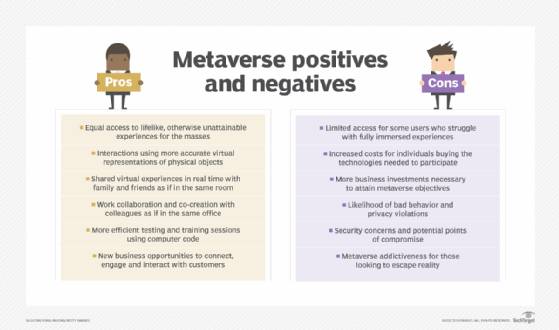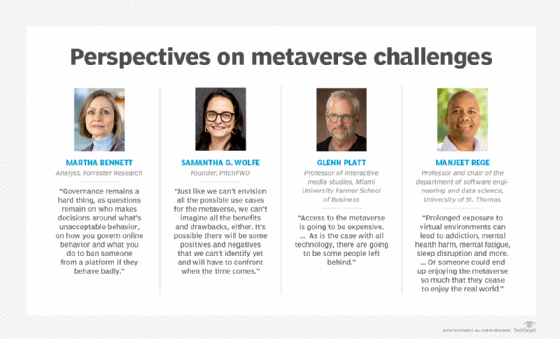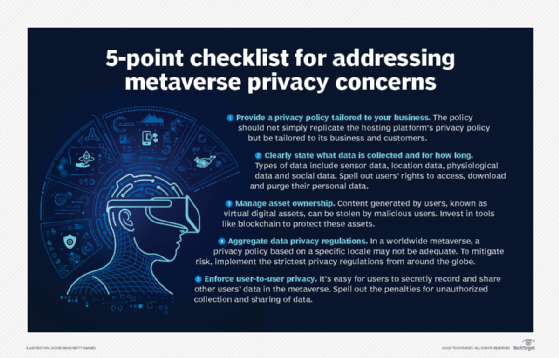Metaverse pros and cons: Top benefits and challenges
Lifelike experiences and new business opportunities are among the potential benefits of the still-developing metaverse. Drawbacks include privacy violations and addiction.
A fully formed metaverse is on the horizon, with precursor and metaverse-like experiences already a reality today.
A growing number of organizations are using metaverse-type technology to train workers, collaborate and innovate. And an increasing number of consumers are tuning into the concept of the metaverse, snapping up Apple Vision Pro and Meta Quest 3 to try out the immersive experiences they enable.
Those forays into today's version of the metaverse are spurring growth: The metaverse is poised to be a $400 billion economic powerhouse by 2030, up from $48 billion in 2022, according to GlobalData's 2023 "Metaverse -- Thematic Intelligence" report.
As envisioned by analysts and researchers, the metaverse will be a persistent, immersive, shared digital environment where people can interact with each other and transact with businesses. It will blend the physical and virtual worlds, enabling people to engage in an online 3D space, or the spatial web, almost as if their experience were real life. Other technologies, including AI, blockchain, and virtual reality (VR) and augmented reality headsets, will enable key metaverse functions and experiences.
Whether the metaverse exists today depends on who is speaking. Some experts point to existing immersive experiences, such as those offered in Second Life, and classify those as the metaverse. Others put such experiences in the precursor category.
Despite those differing assessments, both camps seem to agree that the metaverse platforms that exist today will continue to evolve, with improving technologies and expanding content, along with ever-increasing digital connections promising to create more, and richer, truly immersive experiences.
Although the metaverse is still in its early stages, it already has demonstrated tremendous potential, according to tech leaders, researchers and analysts.
The metaverse simultaneously has exposed some concerning issues and potential drawbacks.
Here is a look at the anticipated pros and cons of the metaverse, according to experts.

Metaverse pros
A fully realized metaverse may still be years away, but several positives and emerging applications that the technology delivers have already been identified.
Improbable and even impossible experiences
Only a select few can venture into outer space, have the fortitude to scale the Himalayas or are athletic enough to surf the largest waves. The metaverse, however, is expected to deliver lifelike experiences such as these to the masses in their own environments. Consider, for example, the potential for researchers to immerse themselves in something as small as a human cell to see and study its functions from within it, said Glenn Platt, professor of interactive media studies at Miami University's Farmer School of Business. That's the kind of experience that the metaverse is uniquely poised to deliver.
More equal access to virtual experiences
The metaverse could be an equalizer, giving people access to existing experiences that were shut off to them for reasons such as cost, distance or disabilities. Science students in rural areas who had limited or no access to advanced biotechnology labs would have easy access to such facilities using the metaverse as students whose schools have labs in their buildings currently do, said Tibor Mérey, managing director and partner with BCG X, part of Boston Consulting Group. Moreover, he said metaverse experiences often come at a fraction of the cost of equivalent real-world experiences, another factor that shows how the metaverse could level the playing field. Additionally, the metaverse could open up experiences to those who otherwise wouldn't have them in the real world due to users' physical limitations. For example, individuals living in the tropics and those with physical disabilities could travel to snow-capped mountains and experience what it might be like to hike them.
Heightened social connections and lifelike interactions
Users can expect not only to have new experiences in the metaverse, but they'll also be able to share those experiences in real time with friends, family or anyone they want, as if they're together in the real world. "You can reach people around the world; you can find a kindred spirit anywhere in the world because the metaverse creates the potential for wider communities of interest," said Martha Bennett, analyst with Forrester Research.
More accurate representations of physical objects in the virtual world
The metaverse will let people see and interact with physical objects as if they were real, said Manjeet Rege, professor and chair of the department of software engineering and data science at the University of St. Thomas. A car shopper, for example, could visit an auto dealer in a fully immersive spatial web, examine car models, test drive them and check out how they themselves would look in different vehicles in different colors.
Better collaboration and cocreation
Because the metaverse promises to mimic real-world social interactions and accurately represent physical objects in three dimensions, individuals will be able to collaborate in the metaverse as if they were all in the same room. Geoffrey Long, assistant professor in the department of emerging technology in business and design at Miami University, detailed what this might look like, saying citizens could come together in the metaverse to not only discuss and debate a proposed development but also to view its design and placement, propose modifications and come to a consensus on what would work best for all parties using as close-to-real-life information as possible. Examples of such digital collaboration already exist. In one case, surgeons in Brazil used VR headsets to successfully separate conjoined twins with real-time assistance from surgeons located in their own countries. That could be just the start, other experts said, saying that they expect people will be able to come together in the metaverse and cocreate in new ways.
"For users, the degree of realness [offered by the metaverse], the fidelity of communication with the technology, the better connection with people and the better collaboration could span better ideas and better innovation," said Chris Johnson, partner at management consulting firm Bain.
More effective, efficient testing and training
The metaverse will do more than support remote work and collaboration beyond geographic and physical barriers; it will enable a whole new level of testing and training with great efficiency. Teams will be able to test ideas, as well as train and practice in the metaverse with computer code instead of physical resources, said Samantha G. Wolfe, founder of PitchFWD, a strategic branding and marketing consultancy focused on emerging technology; adjunct professor at New York University Steinhardt School; and co-author of Metaversed: See Beyond the Hype.
This use of the metaverse could cut down on the significant time and expense of real-world R&D activities, and it could drastically reduce the amount of raw materials used in R&D. Furthermore, the immersive, interactive, engaging and imaginative qualities of the metaverse could aid ideation.
New business opportunities
The metaverse's unlimited potential reaches beyond technology companies and gaming platforms. Businesses are beginning to use metaverse-like experiences to connect, engage and interact with customers in new and different ways. Fidelity Investments, for example, created an immersive experience in Decentraland to educate and engage consumers in the digital world, while luxury fashion brands are already selling virtual versions of their wares in digital department stores.
"There are new avenues of business for companies to explore, such as hosting virtual retail experiences or selling a physical product with a digital one, too," Rege said. Those market opportunities are in addition to the ones that the metaverse is creating for tech companies selling the hardware and software for building and enabling access to the metaverse, Johnson added.
Increased opportunities for self-expression
Already, individuals are finding that the metaverse enables them to express themselves in new and changing ways, as well as in ways that aren't possible in the real world, Platt said. "The metaverse allows us to be who we want to be, to present ourselves as we see ourselves," he said.
Bennett cited the case of one user who chose a warrior-type avatar to represent him in a metaverse-like game, a choice he made because it freed him from the physical disabilities he had in the real world.
Metaverse cons
On the road to the metaverse, businesses and individuals also need to be aware of potential potholes.
Limited participation for some
Simulator sickness is a form of motion sickness that users can suffer during immersive experiences. Technological advances address the latency issues that cause motion sickness, Bennett noted, but she and others said some users still may have trouble with fully immersed experiences in virtual spaces. Individuals with auditory or visual disabilities may also have difficulties in the metaverse -- and potentially could be shut out of some experiences altogether if those experiences aren't designed with inclusivity in mind, Bennett added. Additionally, Long said the metaverse likely would exclude -- or intimidate -- individuals with limited digital literacy and thus shut out those individuals, too.
Higher equipment costs and the continuing digital divide
Individuals and enterprises alike will have to shell out some cash to get into the metaverse. Individuals will have to buy the technology that's needed to participate, such as VR headsets. Companies are looking at greater costs as they determine what they'll do with the metaverse, when they should start making investments and what capabilities they'll have to purchase to reach their objectives, experts said.
"Access to the metaverse is going to be expensive. There are going to be haves and have- nots; the NFT [non-fungible token] world was an early glimpse into what's ahead with the metaverse," Platt said. "As is the case with all technology, there are going to be some people left behind."

Potential for bullying, harassment and assault
The bad behavior which exists in the real world, on the internet and across social media has likewise occurred in existing metaverse-like experiences. Some women, for example, have reported that their avatars were groped. Organizations will have to think about the potential for such problems, what safeguards and policies they'll need to establish to address those issues, and how they could enforce those rules, Bennett said. "Governance remains a hard thing still," she added, "as questions remain on who makes decisions around what's bad or unacceptable behavior, how do you govern online behavior, and what do you do to ban someone from a platform if they behave badly."

Crises with identity
Governing behavior raises concerns about the ability to confirm and verify each user's identity in the metaverse, Bennett said. She and others said the metaverse has not yet solved for this, adding that the use of AI to create deepfakes and other scams makes the problem of online identity that much harder. As Rege asked: "How do you know the avatar you're engaging with is the person you think it is? The answer is you don't know."
Additional privacy concerns and security issues
Questions remain about how organizations will approach privacy in the metaverse. Will companies, for example, require avatars to reveal their real identity under all circumstances or just some? Will they hold and use the extensive amount of data they collect on individual users in the metaverse, or instead will government regulators or users themselves seek to limit the use of data? And how will businesses secure the metaverse, considering that the additional devices, like VR headsets, will create more potential points of compromise?
Potential health risks
The metaverse, more so than video games, can potentially be addictive to some people who are looking for an escape, and experts said some individuals may lose the ability to distinguish reality from virtual reality. "Prolonged exposure to virtual environments can lead to addiction, mental health harm, mental fatigue, sleep disruption and more," Rege said, noting that these could be particularly acute issues "for younger users who may struggle to differentiate between virtual and real worlds. Or someone could end up enjoying the metaverse so much that they cease to enjoy the real world."
Ethical concerns
Various organizations, companies, researchers and individuals have pointed out the myriad ethical issues that the metaverse has introduced and could exacerbate in the future. To start, some groups have raised questions about who owns what intellectual property and whether metaverse content creators should have access to that IP. OpenAI and other generative AI makers have faced similar questions and, in fact, have been sued for copyright infringement.
Wolfe said some have raised questions about whether the metaverse could create a surveillance state, while Pew Research Center explored the impact that digital technologies could have on free will in a 2023 report titled "The Future of Human Agency." Meanwhile, Rege raised the issue of metaverse's environmental impact, noting that "the metaverse relies on vast amounts of computing power, and [thus] energy, and that has a significant environmental impact and, of course, contributes to a larger carbon footprint."
How does the metaverse fit into Web 3.0?
The terms metaverse and Web 3.0 are often used interchangeably, but they represent distinct concepts. Web 3.0, or Web3, refers to a vision of the internet characterized by the following features:
- Decentralization.
- Blockchain integration.
- Interoperability.
- Digital ownership.
- Cross-platform compatibility.
The following link explains more about the differences between Web 3.0 and the metaverse.
This is just the beginning
The metaverse is a gradual story that will evolve over years, with multiple factors influencing how quickly the metaverse will mature, including the pace of consumer adoption, the rate of enterprise investment and government regulations.
That leaves a lot of unknowns ahead, Wolfe said.
"Just like we can't envision all the possible use cases for the metaverse, we can't imagine all the benefits and drawbacks, either," she added. "It's possible that there will be some positives, and some negatives, that we can't identify yet and will have to confront when the time comes."
Mary K. Pratt is an award-winning freelance journalist with a focus on covering enterprise IT and cybersecurity management.







